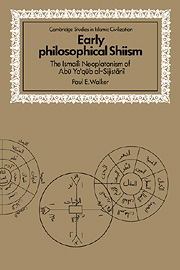Book contents
- Frontmatter
- Contents
- Preface
- Acknowledgments
- Note on transliteration
- List of abbreviations
- PART I AL-SIJISTĀNĪ'S HERITAGE
- PART II AL-SIJISTĀNĪ'S UNIVERSE
- 4 Introduction: categories of thought and terms of analysis
- 5 A theology of unqualified transcendence
- 6 Creation as command
- 7 Intellect, the sum of existent being
- 8 Descending and ascending soul
- 9 Nature and the physical realm
- 10 A cosmic anthropology
- 11 Prophecy, the deputy of intellect
- 12 Interpretation and its institution
- 13 Salvation and the womb of history
- EPILOGUE: THE USE AND CONTROL OF REASON
- Notes
- Select bibliography
- Index
11 - Prophecy, the deputy of intellect
Published online by Cambridge University Press: 02 November 2009
- Frontmatter
- Contents
- Preface
- Acknowledgments
- Note on transliteration
- List of abbreviations
- PART I AL-SIJISTĀNĪ'S HERITAGE
- PART II AL-SIJISTĀNĪ'S UNIVERSE
- 4 Introduction: categories of thought and terms of analysis
- 5 A theology of unqualified transcendence
- 6 Creation as command
- 7 Intellect, the sum of existent being
- 8 Descending and ascending soul
- 9 Nature and the physical realm
- 10 A cosmic anthropology
- 11 Prophecy, the deputy of intellect
- 12 Interpretation and its institution
- 13 Salvation and the womb of history
- EPILOGUE: THE USE AND CONTROL OF REASON
- Notes
- Select bibliography
- Index
Summary
In contrast to many Shiite writers of his period, al-Sijistānī tends to avoid the subject of the imamate as an institution by itself. Apparently, his major concerns did not include the question of who does or does not have the right to lead the Muslim community at a specific moment. This heatedly debated topic has little space in his surviving treatises and such an immediately political issue involves a kind of polemic that might seem foreign to the lofty philosophical themes he is more apt to pursue. In place of arguments about the right to the imamate, he offers a theoretical discussion of prophecy itself, concentrating his attention, therefore, on the general question of the prophetic role in cosmic rather than political terms. Unlike other themes considered in this study, al-Sijistānī composed an entire volume on this one subject.
Among prophecy's major philosophical problems, perhaps the most serious for al-Sijistānī, given his wish to reconcile a dogma of revelation with Neoplatonic philosophy, is why it should have been necessary for there to be more than one prophet and, if more than one, why an intermittently repeating series of them? Why if the imposition of law is a corollary of physical existence, as explained in the previous chapter, does the promulgation of that legal system need to be renewed or changed? Why not a single scripture and a single sacred law?
This problem, of course, reintroduces the issue of the meaning and importance of history.
- Type
- Chapter
- Information
- Early Philosophical ShiismThe Isma'ili Neoplatonism of Abu Ya'qub al-Sijistani, pp. 114 - 123Publisher: Cambridge University PressPrint publication year: 1993

